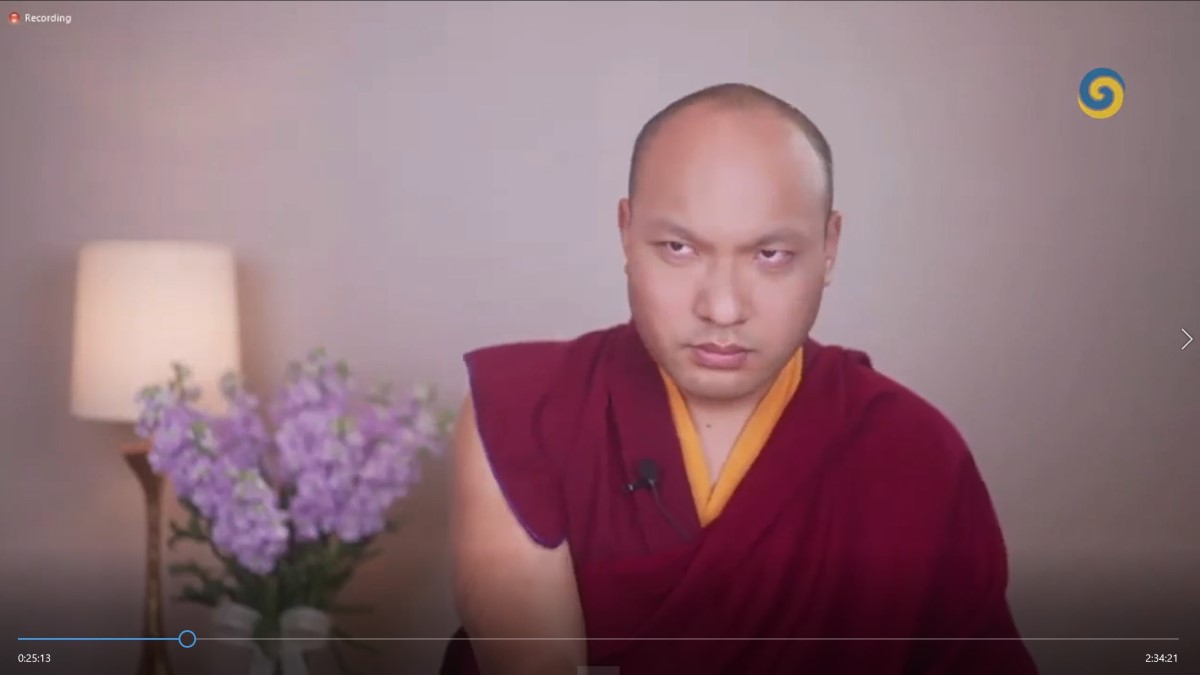法王新闻 | 2022年04月
『第7届谶摩春季』噶玛巴米觉多杰自传•第七天第一堂课
『7th Arya Kshema』AUTOBIOGRAPHICAL VERSES OF KARMAPA MIKYÖ DORJE•7-1
རྗེ་བཙུན་མི་བསྐྱོད་རྡོ་རྗེའི་རྣམ་ཐར། བདེ་བྱེད་མའི་དཔྱིད་ཆོས། ཉིན་འདུན་པ།

時間:2022年04月02日 02nd April, 2022 21:00-22:00(北京时间)
中文口译:堪布丹杰;
中文笔录:释妙竹
English text source from: Arya Kshema website
有所求而行的善,都不是真正的行善
Taking Adversity as the Path in Post-Meditation
好,大家都听得到吗?首先要问候各寺院的僧众,还有善知识,还有祖古、堪布,还有尼寺的所有觉姆尼众(Bamboo:应该是尼寺的所有尼众和僧众),还有观看网路的所有的法友们,大家好。
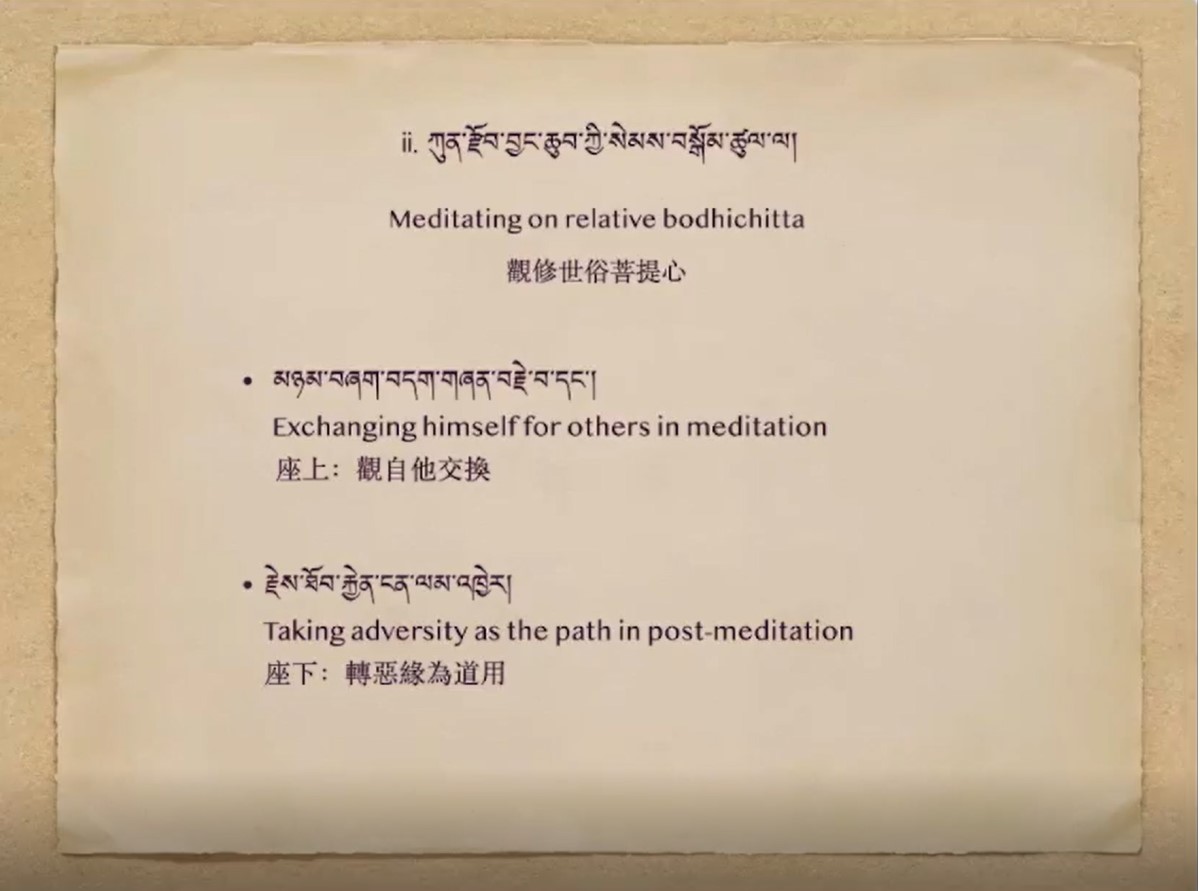
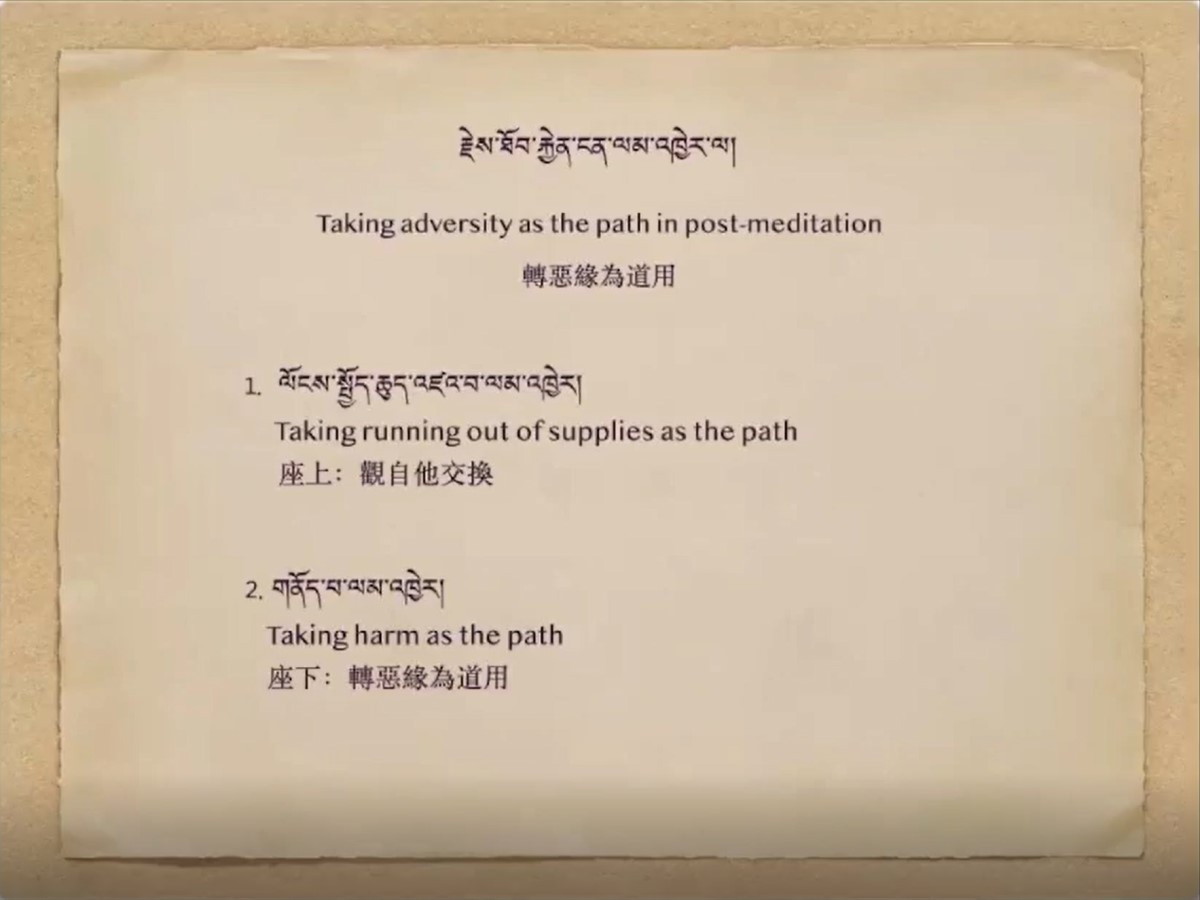
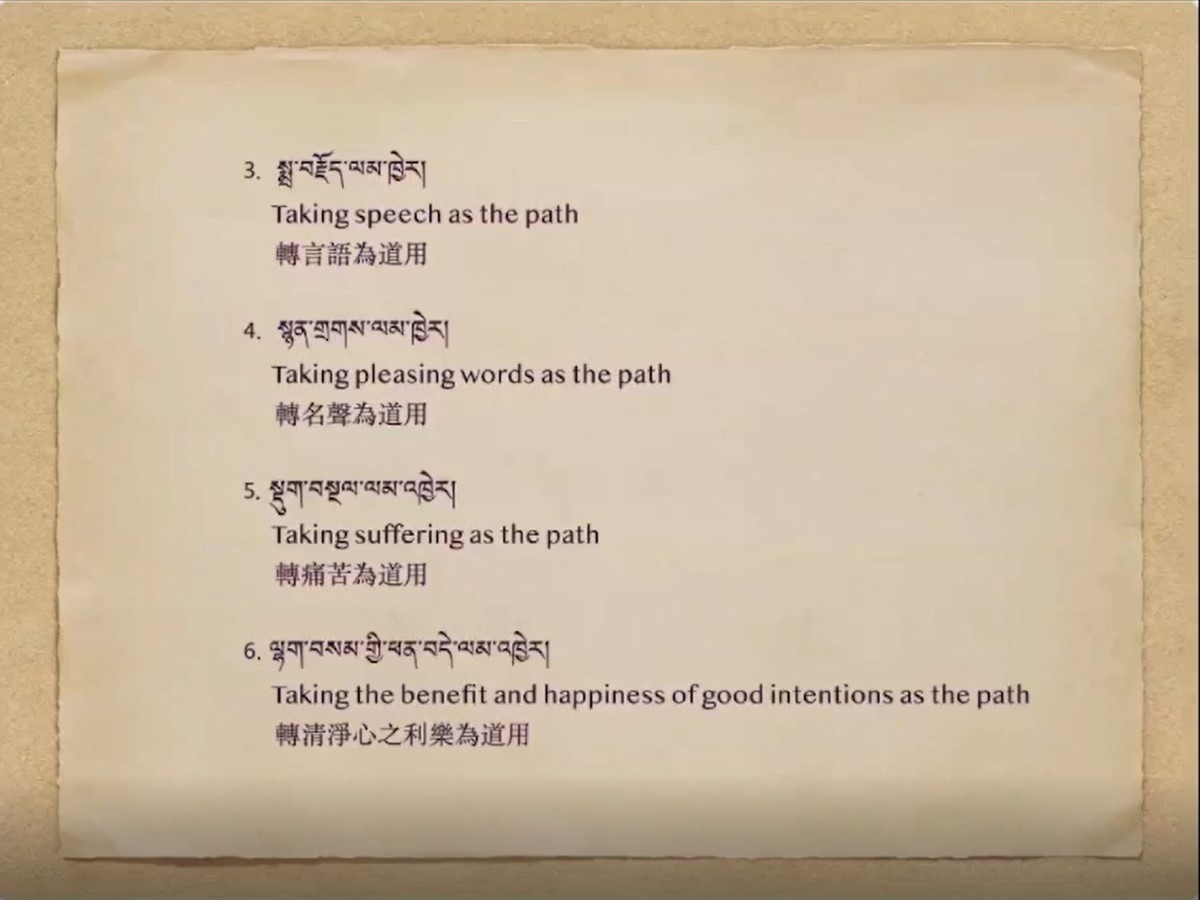
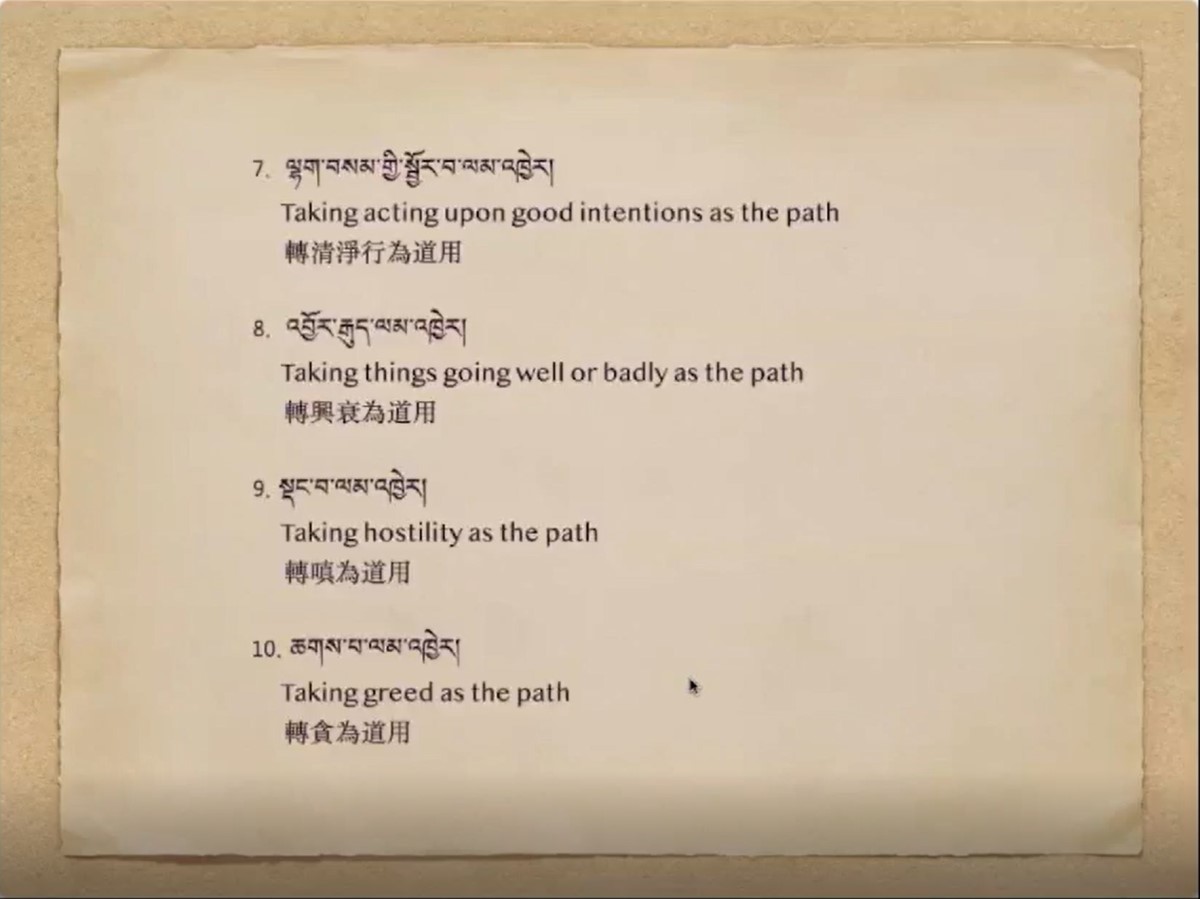
米觉多杰说:“要舍弃巴结和投好。”
今天是谶摩春季课程的第七天,今天我们会讲法王米觉多杰《妙行解脱传》的第14个颂文,还有第15个颂文。那么,米觉多杰的侍者——桑杰巴珠所写的这部传记里面的科判。在谈到“观修世俗菩提心”里面
,有分“座上”跟“座下”,“座上”部分我们讲过了,“座下”——转恶缘为道用的部分,分为十个部分。前三个部分我们已经讲过了,今天要讲的是第四个“转名声为道用”,还有第五个“转痛苦为道用”这两个。
For the seventh day of the Arya Kshema Spring Teachings, the Karmapa spoke about the fourteenth and fifteenth of the good deeds from the Autobiographical Verses Good Deeds by Mikyö Dorje. According to the outline from the commentary by the attendant, Sangye Paldrup, there were two parts to discuss regarding the meditation on relative bodhicitta:
a. Exchanging oneself for others in meditation.
b. Taking adversity as the path in post-meditation.
The Karmapa had completed the first part so now continued to discuss the second part: taking adversity as the path in post-meditation, which contained ten sub-topics. Of the ten sub-topics he had already spoken about the first three so would now embark upon the fourth and the fifth:
4. Taking pleasing words as the path.
5. Taking suffering as the path.
第14个颂文就是这个。好像有些错误,要修改一下。这是第14个。
The Karmapa then read the fourteenth verse from the root text:
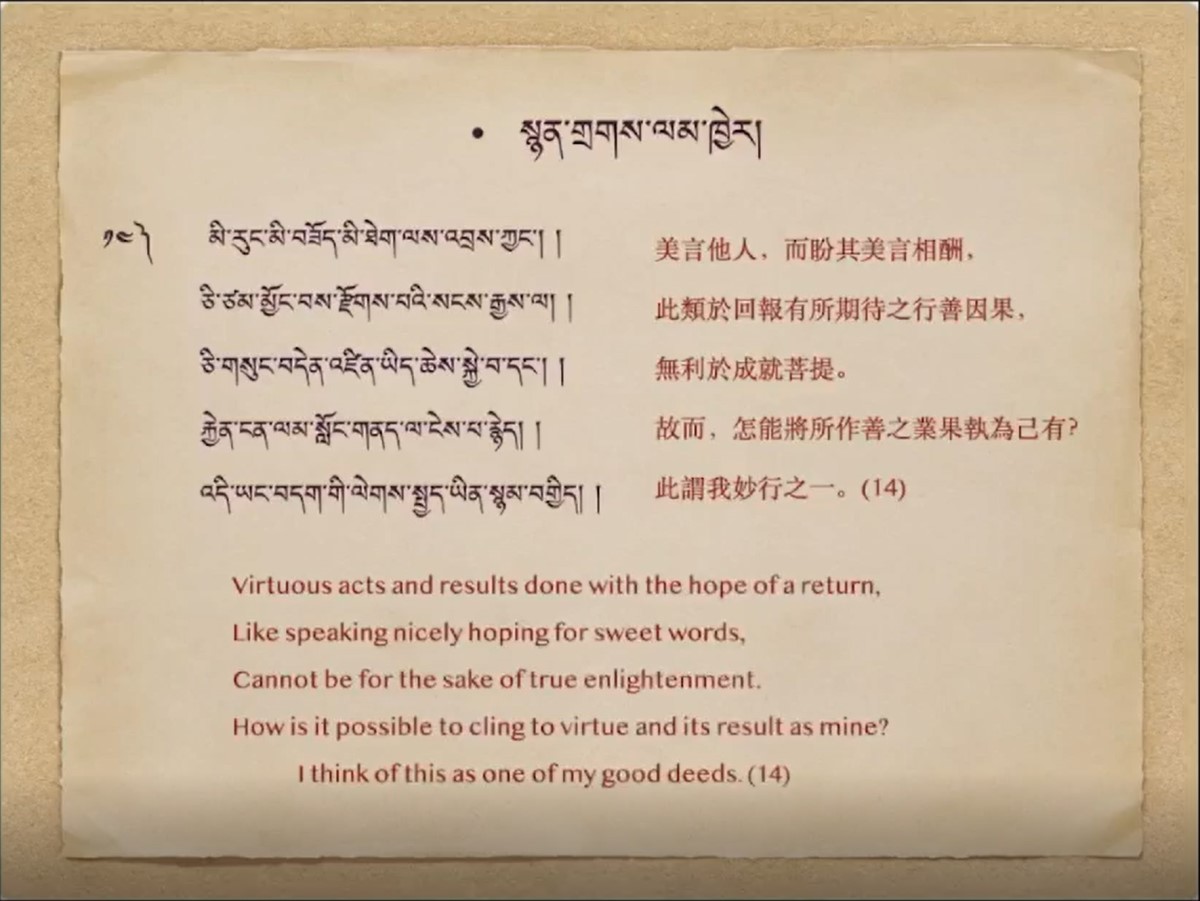
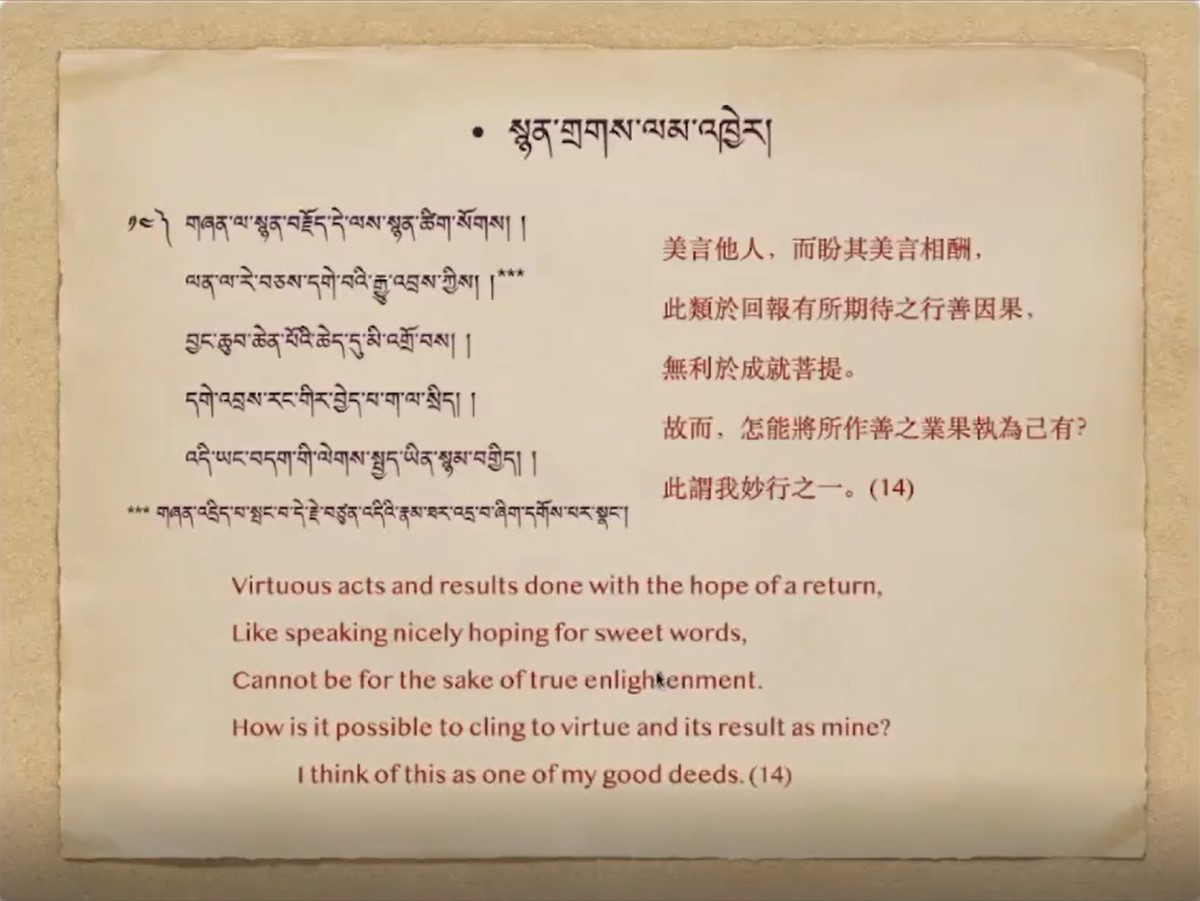
སྙན་གྲགས་ལམ་ཁྱེར། Taking pleasing words as the path 转名声为道用
༡༤༽ གཞན་ལ་སྙན་བརྗོད་དེ་ལས་སྙན་ཚིག་སོགས། ། ལན་ལ་རེ་བཅས་དགེ་བའི་རྒྱུ་འབྲས་ཀྱིས། ། བྱང་ཆུབ་ཆེན་པོའི་ཆེད་དུ་མི་འགྲོ་བས། ། དགེ་འབྲས་རང་གིར་བྱེད་པ་ག་ལ་སྲིད། ། འདི་ཡང་བདག་གི་ལེགས་སྤྱད་ཡིན་སྙམ་བགྱིད། །
***གཞན་འདྲིད་པ་སྤང་བ་དེ་རྗེ་བཙུན་འདིའི་རྣམ་ཐར་འདྲ་བ་ཞིག་དགོས་པར་སྣང་།
Virtuous acts and results done with the hope of a return,
Like speaking nicely hoping for sweet words,Cannot be for the sake of true enlightenment.
How is it possible to cling to virtue and its result as mine?
I think of this as one of my good deeds.(14)
美言他人,而盼其美言相酬,此類於回報有所期待之行善因果,無利於成就菩提。故而,怎能將所作善之業果執為己有?此謂我妙行之一。(14)
这里有一段小字,说:要做到舍弃巴结和投好,就要跟法王的传记所说的一样做到。
After reading the verse, he stated that the second line of the verse contained the following note:
* In giving up deceiving others through craft and fraud, this lord seems to have shown us a necessary example.
总之,在过去也好,现在也好,很多人会赞叹别人说:你真是了不起,你的行为都是正命、正语,符合佛陀说的“八正道”。
但是,大部分说这样的话,说起来好像很好听,但是都是为了要讨好对方,譬如说是要讨好某个施主,得到一些好处,或者希望博得对方的赞誉。所有用了各种不正当的方式,这种阿谀奉承的方式,然后
掩饰了自己和别人的各种缺点、过失。然后把自己跟他人都包装成一个完美的人。
This note indicated that some people believed there were spelling differences in the text that could affect the meaning, and that the line could read, “Like speaking nicely because of good words.”
The Karmapa commented about this in terms of modern life:
When people say they try to engage in right livelihood and right speech, they might be speaking nicely, but their main aim is to use flattery, obsequiousness, and various other methods for personal gain. When they act this way, they do not admit they have faults, but instead, pretend the faults are qualities, even explaining them as positive qualities.
本来,可能是有机会可以说出对方的问题的,帮助对方可以改正,他也应该可以这么做。说出对方的问题,就是帮到对方。但是,他却没有这么做,为什么呢?他主要为了巴结和讨好那个人,所以没有说
真话。还是把对方的很多问题掩盖起来。这样的“善知识”为了要得到“大德”的美名,希望得到很多人的重视,所以把语言上的伪善,看得很重要。有这样的一些“善知识”会这样子做。
If they can prevent another person from doing wrong, instead of stopping them, they do not. They will not speak honestly, not wanting to offend them. Instead, they do not speak straightforwardly or honestly but cover up the faults as positive qualities, trying to save the other person’s reputation saying, “That spiritual friend speaks in a respectable way.” These people consider pseudo-virtuous speech as being the most important.
Bamboo评论:就像米觉多杰一被宁玛派攻击,就吓得赶紧从“大圆满的说法从未在佛经中看到过”改口成“宁玛派是正统、是佛说”,并且还要大家升起这个“正知种子”了。
一般来说,大部分的人不想被别人非议,所以想尽办法说好话、巴结对方,也希望这样子对方就会赞叹自己。他就以为说,想要得到别人的赞美,就要跟别人说好话,
或者说巴结别人,别人就会赞叹自己。也会让自己看起来更有福气、名声等等。
Basically, no one likes being criticized. In order not to be criticized, people praise others, hoping they will be praised too, and in return will not be criticized. These people also think the best way to be praised is to praise others, and then their merit being widely known everywhere.
米觉多杰的伪善,导致的恶报
就像昨天提到过,法王米觉多杰他是怎么样一个人呢?他不是这样子说好话的人,
他是无论对上、对下,对于富有的人也好、对于普通人也好,他都是一视同仁的。总之,他是不会去讨好跟说好话的,一个人没有功德,他也不会刻意赞叹说,他有功德。
他不会说这种假话的。而且他也不会做这种自私的目的的送礼物,譬如说,他送礼物给别人的时候,他不会想说,这个人以后会对我怎么样,他没有带着这样自私的目的而给予别人东西。
总之,法王米觉多杰心中清楚知道,他觉得这种自私自利也好,或者希求今生的各种回报,比如说今生变得有名;或者说别人赞叹自己,觉得自己是一个好修行人等等,这些种种的伪善,
米觉多杰知道说这种伪善是毫无意义的。
Mikyö Dorje never spoke of anyone as being high or low, powerful, or wealthy, or having no power or wealth; he did not distinguish between people in that way. He did not speak about people having qualities they did not have, did not flatter them, and never had an ulterior selfish intent or harbored evil intentions. He did not have selfish thoughts at all. He never held hopes that things would turn out well in this lifetime, nor did he hold thoughts hoping for fame and praise. Mikyö Dorje thought pseudo-virtuous actions—things that were not virtuous but seemed virtuous—were meaningless and pointless.
而且这种伪善的行为,会障碍到人天的果报,更不用说会障碍到解脱的佛果。因为这种伪善,譬如说讨好别人、说好话,目的都是为了今生的。
所以这种伪善行为本身就会障碍你得到人天的果报,更不用说这样的行为也会障碍得到解脱佛果。米觉多杰绝对不会这么做的。
In general, pseudo-virtue, such as doing virtue for the sake of fame in this life alone, is meaningless. Such intentions and actions will not lead to attaining the paths to the higher realms or liberation, because the aim does not consider future lifetimes but only this lifetime. Any action done only for this lifetime will not bring benefit for future lifetimes as it will never be of benefit for reaching omniscience or liberation. That is why Mikyö Dorje never thought them to be important or significant.
所以,在法王米觉多杰那个时候,当时很多人去拜见
法王。很多人希望见了法王之后,能够得到一些法王的赞美。因为有法王的赞美的话,自己的地位也会抬高一些。但是,法王米觉多杰他从来不会说这样子的话,他不会为了一点好处,
讨好、逢迎。所以,很多人虽然渴望得到法王的赞美,结果都得不到,而气急败坏,四处破坏法王的名声。对他说坏话,但是,法王对于他们的这些行为也不在乎。(Bamboo批:不到两年,就被宁玛派骂圆寂了。)
Many people came to see Mikyö Dorje. Many had connections with him so they wished the Karmapa would laud and praise them, spreading their fame so they could gain respect. They thought, “Maybe the Karmapa will compliment me and praise me.” But since he would not laud and praise others or spread their fame for the sake of gain and respect, they would get angry and spread rumors that would harm Mikyö Dorje’s reputation. This happened many times, but no matter how much they did this, Mikyö Dorje never paid much attention to it.
对恶人要升起慈悲
就像在佛法
经典当中会这样子说,就像我们说,在三界当中,当我们修持禅定,通过禅定的力量,会慢慢地超出下界,而往上投生。所以经典当中就提到说:一个人他透过修持,要从欲界当中解脱,
即将要解脱的这样一个人,这时候欲界各种的魔就会集合起来攻击他,要障碍他解脱。但是,这样的一个人,他也会修持慈悲心的禅定,经典中会说,他也会修持这样的一个慈悲心的。
The Dharma says that when we are doing the worldly samadhi, you can go from the lower into the higher realms. When going from the lowest realm, the Desire realm, if you practice dhyana meditation, just before shifting to a higher realm, all the māras will gather to see how they can harm you, trying to prevent you from transcending to a higher realm by acting maliciously. But no matter how hard they try, you should only respond by rousing the samadhi of loving-kindness. You should always have love and not have any malicious thoughts.
Bamboo批:Bamboo本来还洋洋得意,觉得自己莫非是要成佛了,所以才要经历“八相成道”最后一关——被群魔围殴。搞了半天,现在还只是要从最低级的欲界解脱,而被围殴成这样。就好比要从 猪蜕变为驴,就这么难!
所以,他还只是在三界当中,可以说“世间”的这样的一个人,修着世间禅定的这样的一个人,他都会对于欲界的魔,他都升起慈悲心。(Bamboo的慈悲心就是,让这些坏人赶紧死掉!)
更不用说,如果你是一个菩萨,也就是说发心要得到这种“不住轮、涅二边的佛的果位”和发心“救度一切众生出离痛苦”的一个菩萨(Bamboo就发心要当大宝的小弟)。那么,如果
有一、两个众生他伤害到你,你如果是这样一个发心的菩萨,你也不会因为这样的人的伤害,而扰乱到你的心,你是不会的,而且你会更对他们升起广大的慈悲心(Bamboo批:米觉多杰就是被
这种屁话给误导了,你对坏人越慈悲,他们就越嚣张。看大宝周围这些坏人,变本加厉地欺负他就知道了)。
If that is so for people doing worldly samadhi, then the bodhisattvas need an even vaster vision than that. Bodhisattvas wish to reach the state that dwells in neither saṃsāra nor nirvāṇa. They want to achieve the state of omniscience. Also, since bodhisattvas strive to liberate all sentient beings throughout space from suffering, there will be sentient beings who want to harm them. The bodhisattvas must have great loving kindness and especial compassion for them.
所以,其实我们看到,社会上很多人都把痛苦当成是快乐,总是在追求着名声、地位,这些东西。但其实,这些的本质都是痛苦。
但是,世间的人都把这些当成是快乐。结果还要让别人来赞叹自己,这样的行为。其实真的好好想一想,还有比这些人更值得怜悯的吗?如果有这样的人伤害到我们自己的话,
其实是不应该对他们升起憎恨,而是更应该怜悯他们的。
When you think about these points, consider the people in our society these days who have fallen into suffering. They mistake fake happiness for pleasure. They believe that high status, power, and wealth will bring happiness, but instead, the longing for these worldly concerns brings suffering because of not bringing pleasure. These people think that if they can persuade others to praise them and think well of them, they might find happiness, but it is only a fake happiness. When we think about this, we should have more compassion. This behavior is not something we should feel angry about.
所以米觉多杰在平时,无论是在赞叹某个人的时候,他都是很真切地希望,真的是祝福这个人,希望帮助到对方而说的。他不会随随便便地说话的。甚至就是平时开个玩笑也好,或者
只是一般的闲聊,你都可以感受到法王米觉多杰他的慈悲,一种殊胜吧!他说话都有一种特别的慈悲、一种殊胜。而且,他的这些内容,你会觉得想要把它都写下来,把它记录下来。
因为这些内容讲得都是在提醒我们“善恶取舍”的要点。对于世间法、出世间法上一些重要的口诀,随时的每句话都是言之有物的,带着慈悲、殊胜的力量的。所以,佛经当中谈到,
“八正道”当中,有一个叫“正语”,大概说的就是:米觉多杰的话就是“八正道”当中所谓的“正语”。
Mikyö Dorje understood this. Whenever Mikyö Dorje spoke to other people, or when he would praise someone, he would always speak from a deep understanding. He would always consider whether this would bring benefit and happiness to all. Even when he made jokes or engaged in ordinary conversation, the way he spoke was different than how anyone else did. He spoke with weighty words. People would think, “Maybe I should write this down.”
When he pointed out the crucial points of practicing virtue and giving up misdeeds, or when he spoke about dharma, or worldly affairs, he was always making crucial points. When thinking about the meaning of right speech—one of the eight branches of the noble path—that meaning should be measured against Mikyö Dorje’s speech.
Bamboo评论:大宝都是第一堂课,吹嘘米觉多杰怎么怎么好,第二堂课才说点米觉多杰的真实行谊。如果第一堂课不胡乱吹点好的,第二堂课的直播就要被掐掉,或者换成假的了。
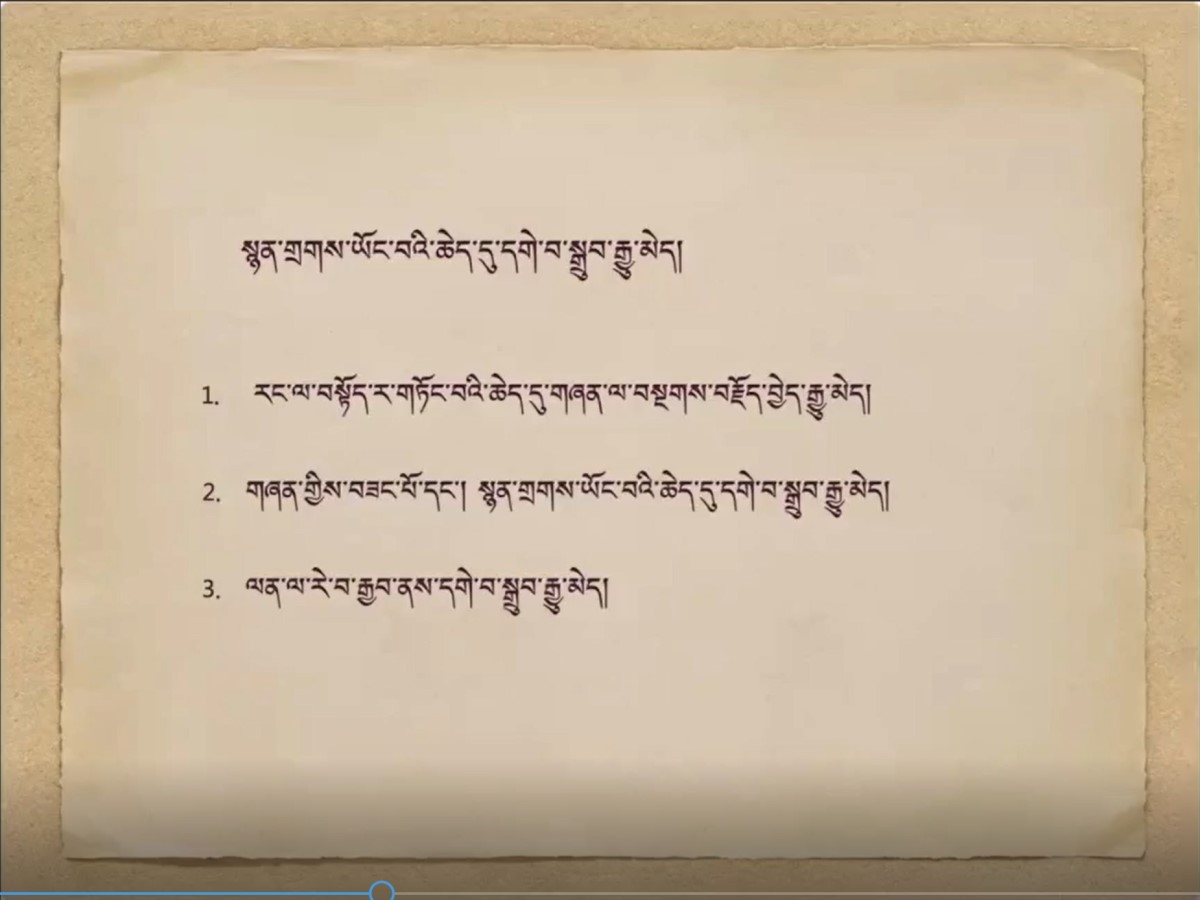
སྙན་གྲགས་ཡོང་བའི་ཆེད་དུ་དགེ་བ་སྒྲུབ་རྒྱུ་མེད། 为名声故,善业不成
1.རང་ལ་བསྟོད་ར་གཏོང་བའི་ཆེད་དུ་གཞན་ལ་བསྔགས་བརྗོད་བྱེད་རྒྱུ་མེད།
2. གཞན་གྱིས་བཟང་པོ་དང་། སྙན་གྲགས་ཡོང་བའི་ཆེད་དུ་དགེ་བ་སྒྲུབ་རྒྱུ་མེད།
3.ལན་ལ་རེ་བ་རྒྱབ་ནས་དགེ་བ་སྒྲུབ་རྒྱུ་མེད།
现代人的慈善都是假慈善
这个就是第14个颂文,它最主要在谈的就是,我们在行善的时候,不要求回报。
The main points in the fourteenth good deed can be summarized as: when we accumulate virtue, we should not expect a response.
在这里面,另外还有三个部分我们要了解,
第一个是,不要为了得到别人的夸赞、关注,或者按“赞”,现在来说,脸书啊,为了得到别人的按“赞”,而去做很多的事情,不要这么做,这是第一个部分。
Then the Karmapa expanded upon this summary by returning to the three main points from the outline sub-topics:
1. Complimenting others in order to be praised, cared about, or have people show their affection
这是什么意思?当然这首颂文是米觉多杰那时候写的,古时候写的,可能要现在白话来解释,会比较明白一点。意思是什么?就是“我们不应该为了得到别人的赞美,
而去赞美别人,也就是不应该为了别人夸奖我们,而去夸奖别人。话句话说,我们去做一件好事,不能是为了得到别人的赞美,或者是关注,而去做,这样是不行的。
Although this stanza was written long ago, it still applies to the present-day. Mikyö Dorje states that the aim of virtue is not for praise, for that is not true virtue. We should not praise others so that they will praise us or so we receive compliments.
这里有一个很好的例子,就像现在有很多人喜欢穿的很漂亮,当然各位是僧众嘛,就这一件衣服。但一般人会打扮的很漂亮,然后呢,自拍!会各种角度来自拍!
然后上、下、左、右,总之各种角度一定要拍得好!不仅仅是人要拍得好看,而且身材比例要拍得好,不能太胖、不能太瘦等等,所以这是第一步——拍!
These days many people wear stylish clothes when they go out—although monastics would not do this—but generally, when people go out, they will want to take a selfie of themselves, then look at how they can look the best after they take it.
“拍”还不够,接着第二步还要做什么呢?修图!要放到“修图”软体里面,修图。譬如说,如果拍得太胖了,就修瘦一点,慢慢可能花一点时间,几分钟,修到自己满意之后,
上传!然后就等着,等着什么呢?等着别人按“赞”,还有“关注”。所以其实现在很多时候,真的见到那个人,搞不好还不认识那个人,因为跟照片差太多了。
“修图”修太多了。总之,这样的一个行为,自拍、上传、等人按“赞”,其实就是等着这里所说的“等着别人的赞美”而做的这样一种行为。我不是说,你们不可以这么做,但是动机跟目的是什么
要清楚。
They do all sorts of things to make themselves look beautiful and make their body look good, even using a beauty app to look unbelievably attractive. When they are satisfied, they post their photo on social media and wait, hoping they will get likes. They hope and wait, having made completely artificial images of themselves, even though in reality, the person in the photo and the actual person are completely different. They do this so other people will like them, admire them, and then they can gain praises and compliments.
再举另外一个例子,如果今天要门要去拉萨朝圣,拜见觉沃佛,或者好久没有拜见自己的上师,所以要去拜见他。
或者,我听说在藏地,有些老妈妈,要去朝圣。有些圣地是在比较偏远的山上,是要爬上山去的,但是她们还是会穿上新的衣服,而且很漂亮的衣服,去朝圣。
为什么她们要穿上漂亮、新的衣服去朝圣呢?是因为她们的心中,她们对于,比如说要去大昭寺礼拜“觉沃佛”;或者她们要拜见上师,很久没有见到了;
或者是到圣地,她们心中总之是带有一种尊敬、虔敬的心的,所以她们要盛装打扮。她们这样子的装扮,不是为了赞美,更不是为了关注,而去做的。
However, in Tibet, when older women would go to the Jokhang in Lhasa or meet their root guru, or when they would visit a sacred site or a retreat cave on a rocky mountain, they would dress in new clothes and wear them well. They would do this because they had great faith and devotion at sites such as the Jowo statue, or their root gurus. So they went to pay their respects, and dressed well to show their reverence to their faith, and as a result were excited and happy. They did not dress up and wear new clothes to gain praise from other people.
再来,还有种情况,我们说要盛装打扮的情况。比如说,我们去参加婚礼,或者颁奖典礼,或者各种盛大的庆典的时候,这种时候,自己在服装、仪容上,
也都必须要配合场合,然后有适当的需求、标准,你去做出一些适当的调整。这都是应该要去做的。
Also, if you are invited to go to a big celebration such as a wedding, award ceremony, or some other big event, you should wear clothes that are appropriate to the occasion, and that is good, for if you do not, it is not appropriate.
另外一个情况是,如果你要去的是孤儿院,或者到一些贫困的地方,去布施、发放食物、送东西的话,在这种情况之下,如果你还穿得花枝招展,脸上化的都是
浓妆的话,那就实在是很奇怪。 前面这些照相也好、穿衣服这些例子,生活当中例子不止这些而已,很多的。为了求得关注而做。再一些例子,譬如现在很多明星,歌星也好,他们都会去做一些慈善、善事。一方面来看,他们的确很有爱心、很有善心。另外一方面来看,他们这么做,
可能其实是为了自己的形象,和社会上的名声,而做的。 佛教徒应该怎样行善? 但是讲回来,我们身为一个佛教徒,我们的想法应该是什么?我们做任何事的时候,绝对不能是为了要博得别人的赞美,或者说掌声,或者说“关注”
而去做这些善事,这是不行的,不能这样去做。一般来说,读经,或者闭关修行,这都是非常好的,这也都是我们应该随喜的事情。但是,如果
这么做,是为了让别人赞叹自己,赞叹自己说:“哇,你真是了不起的一个人。你看了这么多的书,你闭了这么久的关。哇~你可以修行修这么久啊~”等等,你
是为了要得到这样的一个赞叹,不管你是正在做这件事情的时候,或者做完了之后,总之,你做这件事的目的,是为了让别人对自己有好感,是为了让自己
得到别人的关注。如果是这样子行善的话,就不好了。这样的行善其实没有任何的意义。 这时候,我们可以看看一些好的例子,好的范例。譬如说,在藏地,我小的时候就看到很多,现在也有的,老一辈的那些人,老先生、老太太,他们可能都
不识字,可能什么佛法都不懂,他们怎么做的?他们一辈子,只要有时间,他们就会念诵“六字大明咒”。而且他们每一句念的,心中想的,是为了众生
而念的。他们没有到处宣传,就这样子安安静静的修持,可能都念了十几亿遍了,这样的行善才是真的一种行善。(Bamboo批:不识字、不懂佛法的话,根本就没有分辨的能力,只能是别人叫他念啥,他就念啥。另外这算行啥善呢了?最多就是有点事干,不会东想西想,说三道四的少造恶罢了。) 所以,我们平时,在做任何善行的时候,真的要认真观察自己的动机,初衷是什么?做任何事情开始之前,要好好的观察一下,我做这件事情是为了要帮助别人而做呢?还是其实你是为了要
得到别人的赞叹而做呢?为了自己的名声而做?所以,如果带着这种错误的动机而行善,而别人也以为你在行善,这是欺骗了自己也欺骗了别人。 当然这样讲完之后,可能会觉得我在说,绝对不能够赞叹别人,
和接受别人的赞美,不是的。所以,如果你有这样子的认为的话,这是误解了我的意思。因为就像是噶举派会说,跟着而来的那些成就,是不需要刻意舍弃它的。 那个意思是说,我们本来就不应该为了得到别人的赞叹,而行善。本来就不应该那么去做。但是,你如果真的是好好行善,很自然就会得到别人赞美。这种时候,
你也不用为了要避免“世间八法”,装得超然,然后还在说:“你不要赞叹我!不要赞叹我!”你也不需要这个样子,因为你这样子反而太做作,反而是“世间八法”。
因为你装得没有“世间八法”,这不就是“世间八法”。 这里不是说,“赞美”不好,或者接受赞美不对,不是!但是,我们一定要有一个限度,要懂得节制。不然很多时候,我们会被这种环境,或者被别人影响。很容易
被别人的赞叹,或者被别人的诋毁而心也受到牵动。所以,你自己要有主,要有一个限度,而且也要懂得“节制”。尤其,我们绝对不能让,譬如说,获得“关注”,
获得“赞美”,成为我们行善的主要,或者“唯一的目的”。这可以说是这个颂文主要的内容。 所以这里说“行善”不是为了得到别人的赞美。但不仅是这个重点而已,“米觉多杰的传记”还提醒我们什么呢?就是“行善不能求回报”。这是第二个重点。
“行善”不能对于“回报”有所期待。所以,第一个,行善不是为了得到别人的赞美;第二个,行善也不是为了得到回报。 行善要不求回报 这是什么意思呢?就是我们行善
的动机,不是为了自己将来能够得到善果,换句话说,行善的时候,对结果不要抱有任何的期待。一般来说,“行善”如果是带着累积资粮这样的动机,
那是可以的。但是真正在做“善”的行为的时候,你是不能抱着太大的期待的,你是要放下的,你是要懂得放下“心中的期待”的。 举个例子来说,自己如果有一万块,然后你把它布施出去,你如果心中想着说:“我供养、布施之后,今后会财源滚滚。”这样的想法是正确的吗?不正确。
或者我做了很大的布施,然后你心中想“哦,我今天做了大的布施,未来有一天,希望我能够变成一个很有钱、很有钱的人。”这样的布施,是好的吗?
也很难说“很好”。为什么我们“布施”会变成这个样子? Bamboo评论:以前Bamboo每次捐钱,想用来帮自己度过灾难,或者发点财什么的,最后都发现,捐的钱都进了诈骗团伙的口袋,等于是花钱让自己的业更重了。后来,就一直提醒自己,不要用钱来做善事。 因为现在的人,太过多重视外在的物质生活,所以当我们说“行善”的时候,我们也把“行善”
当成一种外在的物质,但其实“行善”是内心上的一种修为,内心上的一种功德。但是,我们太习惯外在的物质,所以我们一想到“行善”,就会期待
从“外在”就会有一种回报。外面我做了一件善,从外面就会有一种回报得到。 这里,我想举个例子,譬如说,我们种了一棵苹果树。种下去之后,你在那儿天天等着,什么时候会长出苹果。你每天都会到这个苹果树前看它到底什么时候可以长出苹果来。
稍微长出一点枝叶了,稍微看到一点点苹果的样子,你就会想说,什么时候能够吃到那个苹果。你如果天天这样子等着,就像是这个样子。我们现在的行善就像是这个样子,
求回报就是这种感觉。我们行善的确有点像种树,但比较像是,我们是因为比较喜欢苹果树而种它。譬如说,你很喜欢这颗树,要种。你不是因为喜欢吃苹果而种,这是有点不同的。
而且这棵苹果树不是种在自己的院子里。我现在说的是“行善”,“行善”如果跟种树来讲,“行善”的“种树”是,苹果树不是种在自己的院子里,你是种在公园里。因为你就是希望,
种在公园里的话,长出来的苹果所有人都能够吃得到。每个人都吃到的话,大家都吃得很开心的话,你自己也会看得很开心。所以,我们的行善应该要这个样子。我用了种苹果树来做比喻。 一般人的行善太有所求了,好像种了一棵树,马上就想长出东西来,马上我要吃到它。很急着在那等,怎么又不长出来?慢慢对因果又不相信了。但其实如果你真的相信因果的话,
其实,你心中只要相信因果就好,因为苹果终有一天会长出来的,你不需要每天在那等待着、期待着。不然,就象是一般的世间人,很焦虑的。他会想说:“哦,我对他那么好,那
他也应该要对我有些表示才对啊!到底他什么时候才会回报我呢?”这样子的想法、这样子的做法就不是在行善。 Bamboo评论:以前好不容易做上一两件自认为的好事时,总想着什么时候会有好报。后来随时随地都会做一些小的善行,数目多了,就会想不起来,自己做过什么了,这个时候也就不想着什么回报了。 这个就是第14个颂文在讲的内容。我们先休息半个小时,接着再讲第15个颂文。 词汇 བསྟོད་ར་称赞 གཏོང་བ给予 གཏོང་བ夸赞 འདྲིད་པ་欺哄
But if you went to an orphanage or to made donations to the needy dressed up and made up, it might seem strange.
Many celebrities, singers, and movie stars do believe in doing good work and help the poor because they have kind feelings for them. But it is possible that some are doing this to look better in society and improve their reputations. Are you doing this because you are looking for a response when accumulating virtue?
In terms of Buddhism, practitioners should not do virtuous actions for the sake of receiving praise so others can say, “They have great faith and devotion. They’ve studied this many texts. They’ve stayed this long in retreat.” In general, studying and staying in retreat are things we should rejoice in, but not if we expect people to praise us, take an interest in us, and pay attention to us. Accumulating virtue in that way doesn’t have much point.
The Karmapa said that when he was little in Tibet, many older people were illiterate. They didn’t have a broad understanding of the Dharma. But whenever they found time in their lives, they would not waste time, they would recite many mani mantras. They would recite several hundred million mani mantras for the sake of all sentient beings. They did this in a way that no one else could see. The way they accumulated merit is the actual way to accumulate merit.
Then the Karmapa said, “When we are acting virtuously, we absolutely must examine our motivation. What are our initial intentions? Is it a good way that benefits others, or are we acting to receive praise from others? If we have a mistaken motivation when we accumulate virtue, everyone, including ourselves and others, has been deceived by all these fake virtues.”
Some people might think that they must never accept praise from others when doing virtuous actions, but that is not what is being said here. When people have done something good or virtuous, they should not pretend that they do not want the praises or say they cannot accept them. The Kagyu forefathers said, “What happens automatically is a siddhi, so do not give it up.”
2. We should not do virtuous acts so that others will give us good things or a good reputation.Mikyö Dorje said that we should not do a virtuous act so that people will praise us, or do it because we are hoping for results which will bring us benefit. Nor should we hope for such good results.
So why do we do virtuous acts? We do virtuous acts to gather the accumulations. But we must learn how virtuous acts should be done.
If we have a lot of attachment to a good result and have a great expectation for a good return, then we will not be able to be virtuous.
These days, many people have become very attracted only to external things. We only look at the outside. There has been such a great development in external things that we have been fooled by their attractiveness.
We have such strong imprints of external things that we see accumulating virtue as an external quality too, when actually it is internal. As a result, we hope the good result will come from the outside.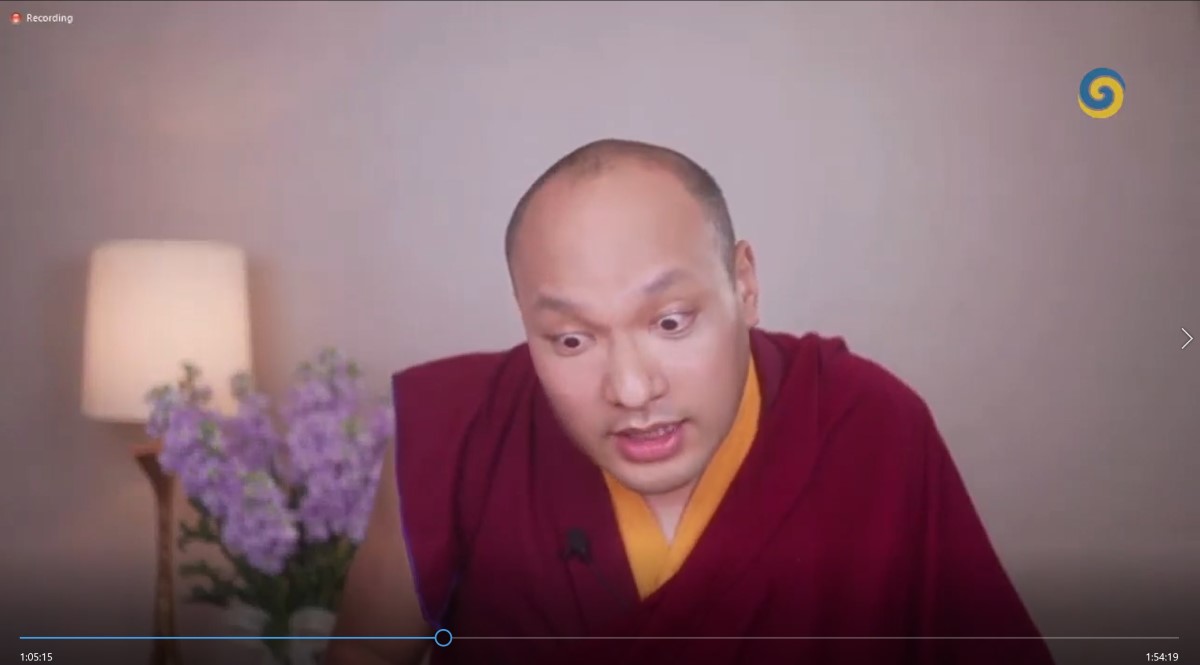
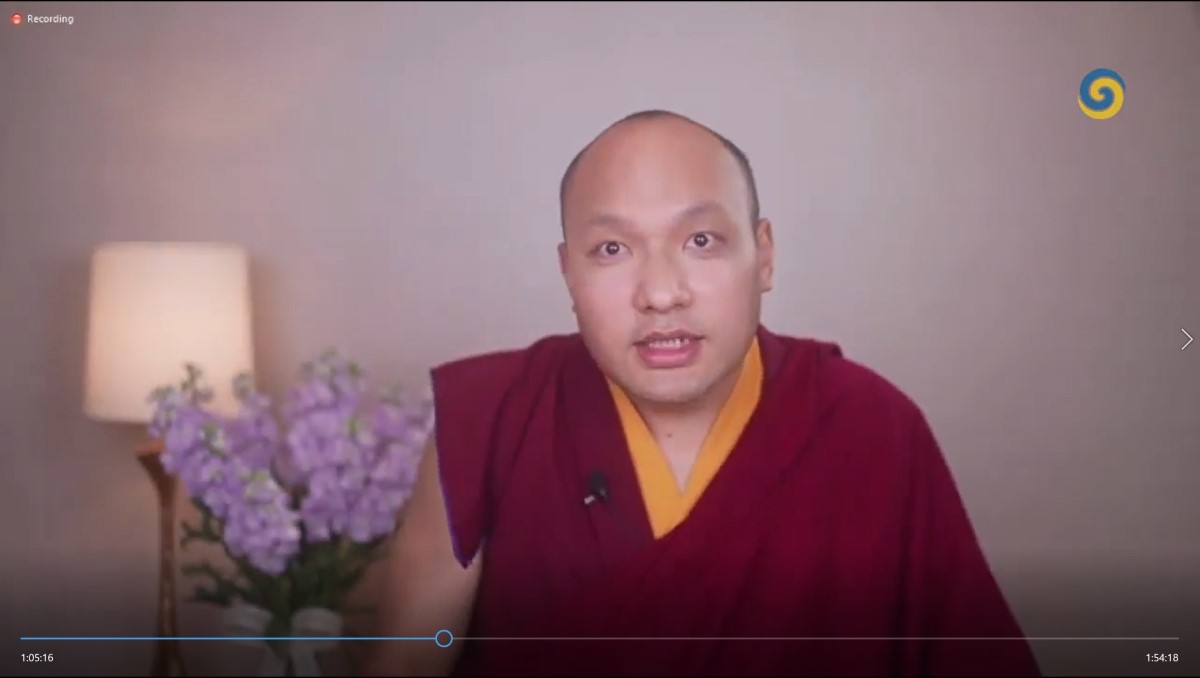
The Karmapa compared accumulating virtue to planting an apple tree: it depends on your motivation. If it is only because we want to eat the fruit, then what happens to our mental state waiting for the fruit to ripen so we can finally eat it? We are constantly looking outside to see if it will bring us the result—eating an apple. If we plant it because we like apple trees, and we plant it not in our own yard but in a public park, then one day when the fruit ripens, we can enjoy eating it and everyone else who goes to the park can enjoy the fruit too. We should then feel satisfied that everyone going to that park can enjoy its fruits and be happy. We should not think it is only for ourselves. We should practice like this.
It is also important to remember that when we practice virtue, the result does not come immediately. You must believe that someday the fruit will ripen.
We should believe in karmic cause and result by thinking, “One day the result will ripen.” We shouldn’t be waiting expectantly for the result every day. We should not have the worldly thought that “I did something good for them, so they have no choice but to do something good for me in return. I wonder when they’ll do something good for me.” That is not accumulating virtue.
Youtube 视频
